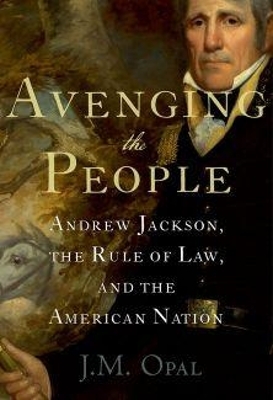
Avenging the People
Andrew Jackson, the Rule of Law, and the American Nation
Seiten
2017
Oxford University Press Inc (Verlag)
978-0-19-975170-9 (ISBN)
Oxford University Press Inc (Verlag)
978-0-19-975170-9 (ISBN)
The most powerful American of his time, Andrew Jackson saw himself as the people's "great avenger." Yet his ideas also limited the people's sovereignty, imposing one kind of law to inflict one sort of "justice." Drawing from new evidence about Jackson and the southern frontiers, Avenging the People boldly reinterprets the man and his age.
Andrew Jackson towered over American life during the second quarter of the nineteenth century, so much so that the period has been dubbed the Jacksonian era. With the passionate support of most voters and their families, he broke through the protocols of the Founding generation, defying constitutional and international norms in the name of the "sovereign people." And yet Jackson's career was no less about limiting that sovereignty, imposing one kind of law over Americans so that they could inflict his sort of "justice" on non-Americans.
Jackson made his name along the Carolina and Tennessee frontiers by representing merchants and creditors and serving governors and judges. At times that meant ejecting white squatters from native lands and returning blacks slaves to native planters. Jackson performed such duties in the name of federal authority and the "law of nations." Yet he also survived an undeclared war with Cherokee and Creek fighters between 1792 and 1794, raging at the Washington administration's failure to "avenge the blood" of white colonists who sometimes leaned towards the Spanish Empire rather than the United States. Even under the friendlier presidency of Thomas Jefferson, Jackson chafed at the terms of national loyalty. During the long war in the south and west from 1811 to 1818 he repeatedly brushed aside state and federal restraints on organized violence, citing his deeper obligations to the people's safety within a terrifying world of hostile empires, lurking warriors, and rebellious slaves. By 1819 white Americans knew him as their "great avenger."
Drawing from recent literatures on Jackson and the early republic and also from new archival sources, Avenging the People portrays him as a peculiar kind of nationalist for a particular form of nation, a grim and principled man whose grim principles made Americans fearsome in some respects and helpless in others.
Andrew Jackson towered over American life during the second quarter of the nineteenth century, so much so that the period has been dubbed the Jacksonian era. With the passionate support of most voters and their families, he broke through the protocols of the Founding generation, defying constitutional and international norms in the name of the "sovereign people." And yet Jackson's career was no less about limiting that sovereignty, imposing one kind of law over Americans so that they could inflict his sort of "justice" on non-Americans.
Jackson made his name along the Carolina and Tennessee frontiers by representing merchants and creditors and serving governors and judges. At times that meant ejecting white squatters from native lands and returning blacks slaves to native planters. Jackson performed such duties in the name of federal authority and the "law of nations." Yet he also survived an undeclared war with Cherokee and Creek fighters between 1792 and 1794, raging at the Washington administration's failure to "avenge the blood" of white colonists who sometimes leaned towards the Spanish Empire rather than the United States. Even under the friendlier presidency of Thomas Jefferson, Jackson chafed at the terms of national loyalty. During the long war in the south and west from 1811 to 1818 he repeatedly brushed aside state and federal restraints on organized violence, citing his deeper obligations to the people's safety within a terrifying world of hostile empires, lurking warriors, and rebellious slaves. By 1819 white Americans knew him as their "great avenger."
Drawing from recent literatures on Jackson and the early republic and also from new archival sources, Avenging the People portrays him as a peculiar kind of nationalist for a particular form of nation, a grim and principled man whose grim principles made Americans fearsome in some respects and helpless in others.
J.M. Opal is Associate Professor of History at McGill University. He is the author of Beyond the Farm: National Ambitions in Rural New England and the editor of Common Sense and Other Writings by Thomas Paine.
Acknowledgments
Introduction: In Our Blood
Chapter 1: States of Nature
Chapter 2: A Nation of Laws
Chapter 3: Extreme Frontiers
Chapter 4: I Love My Country and Government
Chapter 5: The Hour of National Vengeance
Chapter 6: The People's Choice
Conclusion: Submit to Nothing
Abbreviations
Notes
Index
| Erscheinungsdatum | 13.05.2017 |
|---|---|
| Zusatzinfo | 21 hts |
| Verlagsort | New York |
| Sprache | englisch |
| Maße | 150 x 226 mm |
| Gewicht | 612 g |
| Themenwelt | Geschichte ► Allgemeine Geschichte ► Neuzeit (bis 1918) |
| Geisteswissenschaften ► Geschichte ► Regional- / Ländergeschichte | |
| Geschichte ► Teilgebiete der Geschichte ► Kulturgeschichte | |
| Geschichte ► Teilgebiete der Geschichte ► Militärgeschichte | |
| Recht / Steuern ► EU / Internationales Recht | |
| Recht / Steuern ► Rechtsgeschichte | |
| ISBN-10 | 0-19-975170-6 / 0199751706 |
| ISBN-13 | 978-0-19-975170-9 / 9780199751709 |
| Zustand | Neuware |
| Haben Sie eine Frage zum Produkt? |
Mehr entdecken
aus dem Bereich
aus dem Bereich
Europa 1848/49 und der Kampf für eine neue Welt
Buch | Hardcover (2023)
DVA (Verlag)
48,00 €
Giordano Bruno - ein ketzerisches Leben
Buch | Hardcover (2024)
C.H.Beck (Verlag)
29,90 €


